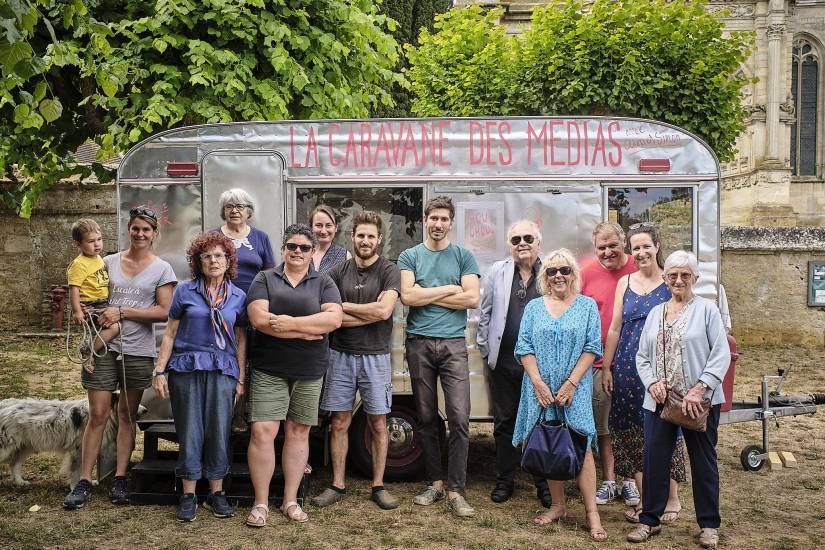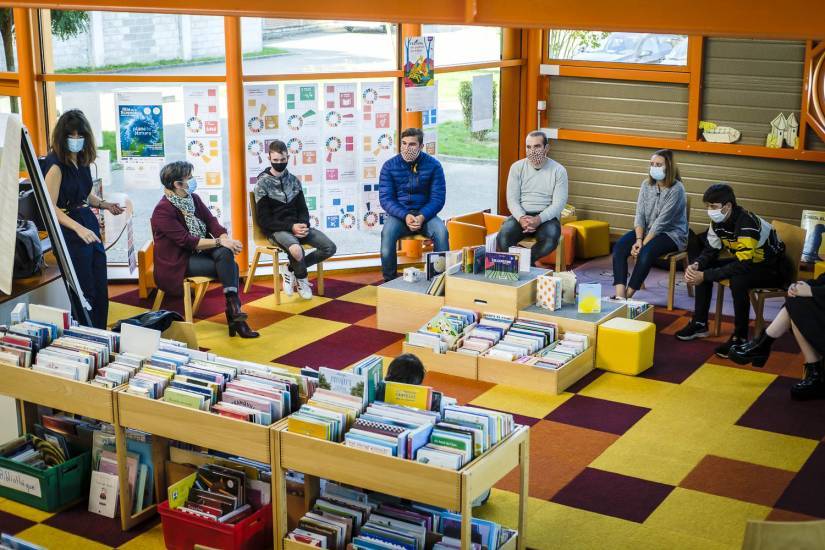L’éducation aux médias et à l’information (EMI) en Hauts-de-France
L’éducation aux médias et à l’information (EMI) est un élément indispensable pour préparer à l’exercice de la citoyenneté en démocratie.
L’EMI doit permettre à chacun de vivre une pratique citoyenne des médias :
- pouvoir s’informer, s’exprimer librement, élargir son horizon, appréhender le monde dans toute sa complexité, développer son esprit critique ;
- acquérir des compétences pour réaliser une lecture critique et distanciée des contenus proposés par l’ensemble des médias , pour rechercher, sélectionner et interpréter des informations, évaluer et analyser les sources des informations proposées ;
- s’affranchir des chemins tracés par les réseaux sociaux, leurs algorithmes et leurs flux ininterrompus ;
- comprendre la valeur des contenus immatériels afin de lutter contre le piratage et valoriser la défense des droits d’auteurs ;
- appréhender les médias, les réseaux et les phénomènes informationnels dans toutes leurs dimensions : économique, sociétale, technique, éthique.
Depuis 2015 , le ministère de la culture propose un plan ambitieux d’éducation aux médias et à l’information, prioritairement à destination des publics jeunes.
La DRAC Hauts-de-France soutient les projets d’éducation aux médias et à l’information et les acteurs impliqués dans ces démarches à travers les dispositifs suivants :
Fonds de soutien aux médias d'information sociale de proximité (FSMISP)
Le ministère de la Culture a créé un fonds de soutien pérenne dédié aux médias d’information sociale de proximité. Outils d’information, d’expression, de création et de dialogue, les médias de proximité tissent un lien de confiance avec les citoyens et constituent le meilleur rempart contre le « populisme numérique ».
Ces médias ont trois atouts :
- ils sont un vecteur d’information et un facteur de cohésion sociale en contribuant à la vigueur du débat démocratique local et en donnant la parole aux habitants, notamment dans les quartiers prioritaires de la politique de la ville ou les zones de revitalisation rurale.
- ils contribuent à valoriser l’image des territoires et à la faire évoluer ;
- ils permettent à un large public de se familiariser avec la pratique journalistique, participant ainsi de l’objectif d’éducation aux médias.
Ces médias peuvent être des services de presse en ligne (site internet de presse, infolettre, webtélé, webradio…), ou également des services de communication au public par voie électronique mettant en ligne des contenus d'intérêt général renouvelés régulièrement et faisant l'objet d'un traitement journalistique.
Le formulaire de candidatures à l’appel à projets est entièrement dématérialisé et accessible uniquement depuis la plateforme « Mes démarches en ligne ».
Nous vous invitons à prendre connaissance des éléments d'information concernant les conditions d'éligibilité de ce fond de soutien dans la rubrique " Aides et démarches" du ministère de la Culture et prendre connaissance du décret ci-aprés.
L’appel à projet « Éducation aux médias et à l’information »
C'est un programme de soutien de la Direction régionale des affaires culturelles Hauts-de-France pour des actions d’éducation aux médias, à l’information et à la liberté d’expression. Le plan d’éducation aux médias et à l’information se décline en 2 volets :
Volet 1 : soutenir les acteurs de l’éducation aux médias et à l’information en région Hauts-de-France
Volet 2 : Renforcer l’accompagnement et le développement de l’éducation aux médias et à l’information en bibliothèque.
Consultez les appels à projets en cours :
Le réseau EMI'cycle : le réseau d'acteurs d'EMI en région Hauts-de-France
Premier réseau régional en son genre, EMI’cycle permet au territoire des Hauts-de-France de devenir « Région pilote ». Le réseau EMI’cycle rassemble des chercheurs, des journalistes, des professionnels de l’éducation nationale, populaire et spécialisée formant ainsi une intelligence collective des acteurs de l’éducation aux médias et à l’information en région Hauts-de-France. Le réseau est observateur des usages, recenseur des acteurs, des compétences, des actions et des modalités d’intervention en EMI à l’échelle régionale, collecteur d’outils et ressources pédagogiques et expérimentateur de démarches pédagogiques innovantes.
EMI’cycle est catalyseur d’une dynamique régionale d’actions d’éducation aux médias et à l’information menées par ses membres.
EMI’cycle défend un égal accès des habitants des Hauts-de-France à l’EMI. Ainsi, EMI’cycle repère les compétences et zones géographiques non-couvertes en matière d’EMI afin d’y remédier par l’intervention et / ou la formation.
Les résidences de journalistes
La DRAC Hauts-de-France souhaite renforcer et développer les actions d’éducation aux médias et à l’information, prioritairement à destination des jeunes publics. Cet engagement s’est entre autre traduit par un renforcement des crédits déconcentrés du BOP 224. Ce programme vise à l’élargissement des démarches de résidence soutenues jusqu’à présent par le ministère dans les domaines artistiques et culturels vers le champ des médias et de l’éducation à l’information.
Ces résidences ont pour vocation de venir en soutien à des projets portés par les territoires, afin de :
- qualifier les productions existantes ou développer de nouveaux projets éditoriaux en favorisant des partenariats entre les médias de proximité et les médias professionnels intéressés qu’ils soient locaux ou nationaux ;
- aider à la structuration ou à la professionnalisation de démarches de médias de proximité ;
- mettre en place des actions d’éducation aux médias et à l’information auprès des publics mobilisés dans des nouveaux projets éditoriaux ou de médias de proximité ;
- mettre en œuvre des actions d’éducation aux médias et à l’information à destination des jeunes.
Ces résidences :
- s’adressent à des journalistes professionnels (journalistes indépendants ou journalistes intégrés dans une rédaction) ;
- dans le cadre de l’EMI, sont positionnées prioritairement sur le hors temps scolaire ou sur une articulation temps scolaire/hors temps scolaire ;
- se déroulent principalement dans des territoires prioritaires (QPV ou zones rurales) ;
- bénéficient de co-financements notamment par les collectivités.
Contact
Amélie GOURGUECHON - Conseillère action culturelle et territoriale, conseillère à l’éducation aux médias et d’une mission de proximité pour le département de l’Oise (Amiens)
Partager la page

